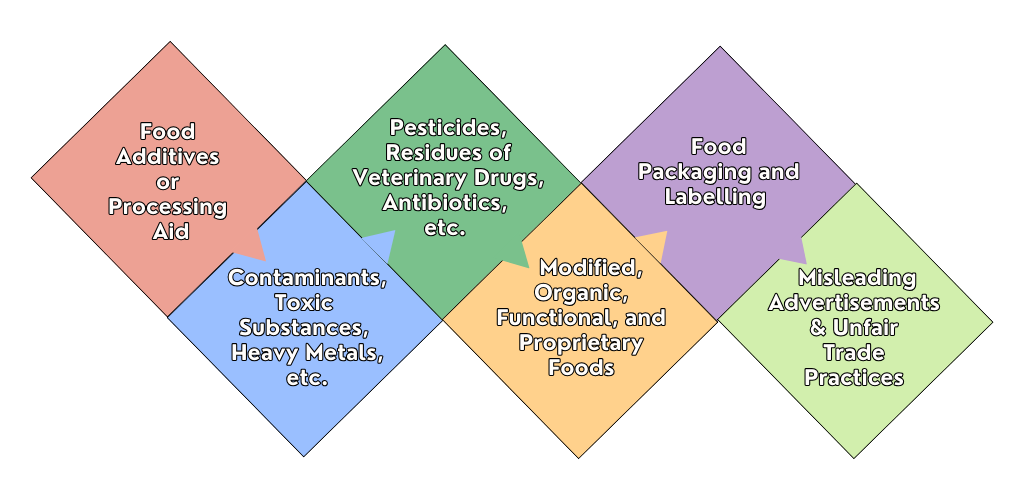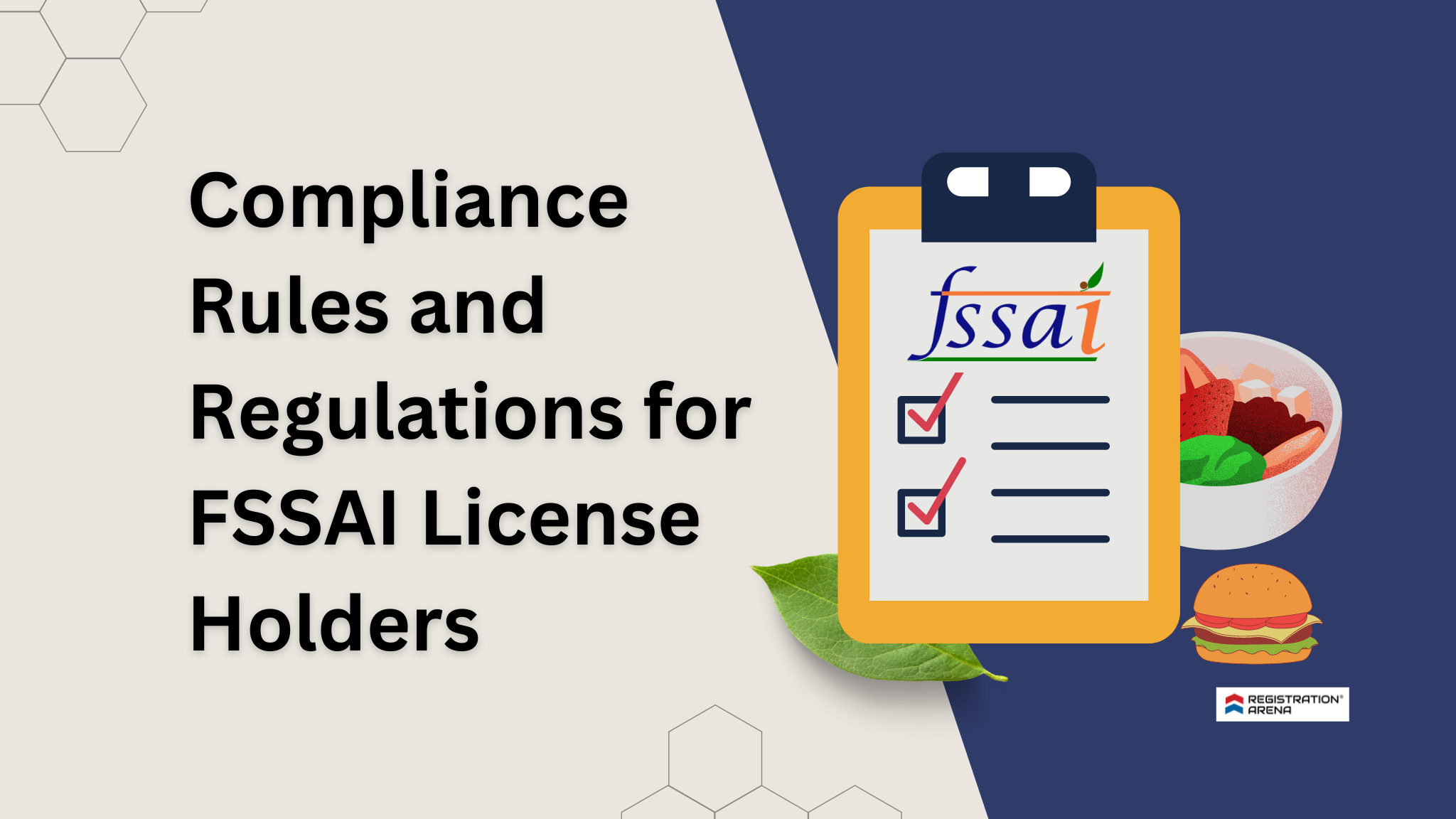Food Business Operators in India like food manufacturing and processing units, hotels, restaurants, temporary stall owners, etc. are required to obtain registration or license as per the Food Safety and Standards Act, 2006. The Food Safety and Standards Authority of India (FSSAI) is the authority that issues licenses to food businesses. Once such Food Business Operators register themselves or obtain a license, they are required to comply with FSSAI rules and regulations. This blog lays down the compliance requirements for FSSAI license holders along with the consequences for non-compliance.
Object of Food Safety and Standards Act, 2006
The Food Safety and Standards (FSS) Act of 2006 provides for the establishment of the Food Safety and Standards Authority of India (FSSAI), also known as the Food Authority. This authority was established to lay down scientific standards for food articles. In addition, it regulates the manufacture, distribution, storage, sale, import, availability, etc. of safe and wholesome food that is fit for human consumption.
In simple words, the object of the FSS Act, 2006, and FSSAI is to ensure that the Food Business Operators (FBOs) provide safe, hygienic, and good quality food to customers.
Also Read: FSSAI Food License: Meaning, Types, Eligibility and Benefits
Compliances for FSSAI Food License Holders
All the food business operators who obtain FSSAI licenses are required to comply with –
- The Food Safety and Standards Act, 2006
- The Food Safety and Standards Rules, 2011
- Different Food Safety and Standards Regulations
General Provisions as per Food Safety and Standards Act, 2006
The Food Safety and Standards Act of 2006 provides the following general provisions relating to food articles.

Food Additives or Processing Aid
Food articles shall not contain any food additives or processing aids unless it is in compliance with FSSAI (Food Products Standards and Food Additives) Regulation, 2011.
Food additives are substances that are added to food to enhance its taste, appearance, shelf life, etc. For example, color, preservatives, etc. It is mandatory to disclose the additives on the label of the packaged food.
On the other hand, processing aids are those substances that are used in the manufacturing of food products. As a result, they may or may not be present in the final product. For example, silicone is used in the manufacturing of beverages for antifoaming. Further, it is not required to disclose the processing aids on labels of food products.
Contaminants, Toxic Substances, Heavy Metals, etc.
Food articles shall not contain contaminants, toxic substances, or heavy metals in excess of the quantity specified in the FSS (Contaminants, Toxins, and Residues) Regulation, 2011.
For example, the regulation provides that fruit and vegetable juice shall not contain lead parts in excess of 1 part per million (by weight).
Pesticides, Residues of Veterinary Drugs, Antibiotics, etc.
Food articles shall not contain residues of pesticides, insecticides, veterinary drugs, antibiotics, solvents, and pharmacologically active substances or microbiological counts in excess of the quantity specified in the FSS (Contaminants, Toxins, and Residues) Regulation, 2011.
In addition, insecticides shall not be directly used on food articles except fumigants.
Modified, Organic, Functional, and Proprietary Foods
No person is allowed to engage in –
- Manufacturing;
- Distributing;
- Selling;
- or Importing
of modified, organic, functional, or proprietary foods, neutraceuticals, or health supplements except in the manner as provided under the FSS (Health Supplements, Nutraceuticals, Food for Special Dietary Use, Food for Special Medical Purpose, Functional Food, and Novel Food) Regulations, 2016.
Modified food means food or food ingredients that contain genetically modified organisms (GMO) for example, corn, soybean, etc.
Organic food means those food products that are produced as per organic production standards, for example, organic grains, organic fruits and vegetables, etc.
Proprietary food means those food articles that are not unsafe but no standards have been specified for them for example, instant tea and coffee, instant noodles, etc.
Functional food, Neutraceuticals, or Health supplements means that food which is formed or processed as per dietary requirements or to cure disease or disorders.
Food Packaging and Labelling
The following are the general provisions regarding food packaging and labeling as per the FSS Act, 2006, FSSAI (Packaging) Regulations, 2018, and FSSAI (Labelling and Display) Regulations, 2020 –
- The information that is given on food products shall be written in English, Hindi, or Devnagri script. However, other languages can be used additionally but in that case, the information in such other language shall not contradict with information in Hindi or English.
- The label shall not contain any false or misleading information about the product.
- Labels shall not be distributed separately from the container.
- The information on the label shall be clear and readable.
- All the necessary information such as batch no., date of manufacturing, expiry date, etc. shall be mentioned on the label and no information shall be concealed in any case.
Misleading Advertisements and Unfair Trade Practices
Food articles shall not be advertised misleadingly or fraudulently. Additionally, a person shall not engage in unfair trade practices such as the sale or supply of food articles by –
- False representation regarding quantity or quality of food;
- Misleading representation regarding its use;
- Giving a guarantee regarding its efficacy.
Specific FSSAI Regulations
In addition to the general provisions mentioned above, FSSAI has formulated the following rules and regulations that apply to food business operators depending on their Kind of Business (KoB) and place of operation –
- FSS (Licensing and Registration of Food Businesses) Regulation, 2011 (Applicable to all food business operators)
- FSS (Prohibition and Restriction of Sales) Regulation, 2011
- FSS (Laboratory and Sampling Analysis) Regulation, 2011
- FSS (Food Recall Procedure) Regulations, 2017
- FSS (Import) Regulations, 2017
- FSS (Approval for Non-Specific Food and Food Ingredients) Regulations, 2017
- FSS (Alcoholic Beverages) Regulations, 2018
- FSS (Fortification of Food) Regulation, 2018
- FSS (Food Safety Auditing) Regulation, 2018
- FSS (Recognition and Notification of Laboratories) Regulation, 2018
- FSS (Recovery and Distribution of Surplus Food) Regulation, 2019
- FSS (Safe Food and Balanced Diets for Children in School) Regulations, 2020
- FSS (Foods for Infant Nutrition) Regulations, 2020
- FSS (Ayurveda Aahara) Regulations, 2022
- FSS (Vegan Foods) Regulations, 2022
FSSAI Annual Return
Every FSSAI food license holder (other than milk and milk product manufacturers) shall file an online return each year in ‘Form D-1’ on the FoSCoS portal. The food products that were handled by the licensee in the previous year shall be disclosed in the return. The due date to file the return is 31st May of each year.
FSSAI Half-Yearly Return
Milk and milk product manufacturers are required to furnish half-yearly returns in the same form ‘Form D-1’, online on the FoSCoS portal. The due date to file a half-yearly return is one month from the end of each half-year, i.e.,

Note – A separate return is required to be filed for each license held by the food business operator.
Consequences of Non-Compliance
The following are the consequences of non-compliance with FSSAI rules and regulations.
Suspension and Cancellation of FSSAI License
Every food business operator who has obtained an FSSAI license or registration shall comply with the Food Safety and Standards Act, 2006, and the Food Safety & Standards (Licensing and Registration of Food Business) Regulations, 2011. If he fails to comply with the act and regulations, the designated officer can issue an improvement notice specifying the measures to be taken by such food business operators.
The officer may suspend his license if the food business operator does not fulfill the requirements of the improvement notice and can cancel his license if he still fails to take the improvement measures, after giving him an opportunity of being heard.
Penalty and Punishment
The following penalties can be levied for non-compliance –
| Type of Non-Compliance | Penalty/ Punishment |
| Food not in compliance with the act or regulation or of the nature/ substance/ quality as demanded by the purchaser | Upto Rs. 5 lakhs For Petty Food Business Operator – Upto Rs. 25,000 |
| Sub-standard food | Upto Rs. 5 lakhs |
| Misbranded food | Upto Rs. 3 lakhs |
| Misleading advertisement | Upto Rs. 10 lakhs |
| Extraneous matter in food | Upto Rs. 1 lakh |
| Non-compliance with directions of the food safety officer | Upto Rs. 2 lakhs |
| Unhygienic processing or manufacturing of food | Upto Rs. 1 lakh |
| Adulterated food | Upto Rs. 2 lakhs, if adulterant is not injurious to health Upto Rs. 10 lakhs, if adulterant is injurious to health |
| Manufacture/ sale/ distribution/ import of unsafe food article |
|
| Carrying on business without a license | Imprisonment for a term upto 6 months and fine upto Rs. 5 lakhs |
| In case of no specific penalty | Upto Rs. 2 lakhs |
Moreover, if the FSSAI license holder fails to file an annual return on or before the due date, then a penalty of Rs. 100 per day is levied until the return is filed. However, the maximum penalty that can be levied is 5 times of the annual fees.
Read More: Complete Guide on How to Get FSSAI License in India
Conclusion
In conclusion, we can say that all the food business operators who obtain FSSAI licenses shall comply with all the applicable rules and regulations. It not only saves the business from penalty and punishment but also enhances its credibility in the eyes of stakeholders.








